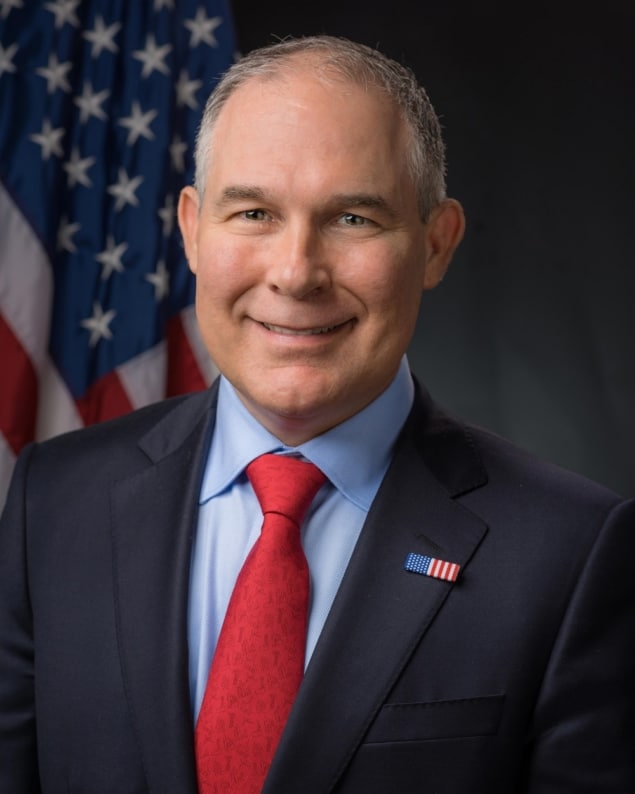
Scott Pruitt has resigned as head of the US Environmental Protection Agency (EPA), just 17 months after taking up the position. US president Donald Trump has announced that Andrew Wheeler – a former lobbyist for the coal industry – will become acting administrator until a new EPA administrator is found. “I have no doubt that [Wheeler] will continue with our great and lasting EPA agenda,” Trump said announcing Wheeler’s promotion.
Pruitt’s time at the EPA has been controversial (see box). When Pruitt was attorney general of Oklahoma from 2011 to 2017 he sued the EPA 14 times. His nomination to lead the EPA in late 2016 even led to the US Environmental Defense Fund to announce its opposition – the first such action in the fund’s 50-year history. Those concerns did not recede during his time in office. Some his decisions, wrote Christine Todd Whitman, EPA administrator under President George W. Bush, presented “real and lasting threats to the nation’s land, air, water, and public health”.
In his resignation letter to Trump, Pruitt cited “unrelenting attacks on me personally, my family” as his reason for stepping down. Yet Pruitt has come under increasing pressure for a number of months following questions about his spending and housing arrangements. In accepting his resignation, Trump noted that Pruitt had done an “outstanding job”.
Trump then quickly announced that Wheeler would become acting administrator. In April, Wheeler was confirmed by the US Senate as Pruitt’s assistant administrator and he has previously served in the EPA’s Office of Pollution Prevention and in the office of Oklahoma Senator James Inhofe. Yet while Wheeler brings more Washington experience than Pruitt, he is also a strong denier of anthropogenic climate change. “We are definitely concerned that he will continue Scott Pruitt’s record of hostility to environmental protections,” says Benjamin Longstreth, a lawyer at the Natural Resources Defense Council.
Analysis: Scott Pruitt leaves a cloudy legacy
When he resigned from his position as administrator of the Environmental Protection Agency (EPA) last week, Scott Pruitt left a cloudy political legacy. Despite the scandals that led to his departure, he had worked hard to fulfill the Trump administration’s platform of reducing environmental regulations to encourage industrial growth. But many of his efforts have had little permanency, making them vulnerable to reversal by any succeeding administration. And others were drafted so poorly that they were almost immediately tied up in legal challenges.
Pruitt had some successes in achieving the Republican party’s environmental policy goals. He played a key role in persuading US president Donald Trump to pull out of the Paris agreement on climate change. He sidelined government scientists inside the EPA and outside academic advisers from policy-making meetings in favour of industry representatives.
Changing government regulations is a complex and time-consuming process that can face frequent legal roadblocks. In several cases, such as the proposal to relieve car companies of the need to improve their fleets’ fuel efficiency, Pruitt issued only initial proposals, without the legal details. Indeed, courts have already overturned at least half a dozen efforts to pull back regulations produced by President Barack Obama’s EPA, on such issues as controlling lead paint and pesticides.
While environmentalists have expressed joy at Pruitt’s departure, such celebrations may be short-lived depending on who succeeds him.



